Fleurs du Mal Magazine



Hans Hermans photos © 2013: Splash 2
fleursdumal.nl magazine
More in: Hans Hermans Photos
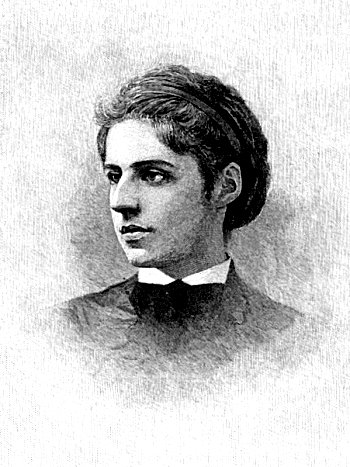
Emma Lazarus
(1849–1887)
Dreams
A dream of lilies: all the blooming earth,
A garden full of fairies and of flowers;
Its only music the glad cry of mirth,
While the warm sun weaves golden-tissued hours;
Hope a bright angel, beautiful and true
As Truth herself, and life a lovely toy,
Which ne’er will weary us, ne’er break, a new
Eternal source of pleasure and of joy.
A dream of roses: vision of Loves tree,
Of beauty and of madness, and as bright
As naught on earth save only dreams can be,
Made fair and odorous with flower and light;
A dream that Love is strong to outlast Time,
That hearts are stronger than forgetfulness,
The slippery sand than changeful waves that climb,
The wind-blown foam than mighty waters’ stress.
A dream of laurels: after much is gone,
Much buried, much lamented, much forgot,
With what remains to do and what is done,
With what yet is, and what, alas! is not,
Man dreams a dream of laurel and of bays,
A dream of crowns and guerdons and rewards,
Wherein sounds sweet the hollow voice of praise,
And bright appears the wreath that it awards.
A dream of poppies, sad and true as Truth,—
That all these dreams were dreams of vanity;
And full of bitter penitence and ruth,
In his last dream, man deems ’twere good to die;
And weeping o’er the visions vain of yore,
In the sad vigils he doth nightly keep,
He dreams it may be good to dream no more,
And life has nothing like Death’s dreamless sleep.
Emma Lazarus poetry
fleursdumal.nl magazine
More in: - Archive Tombeau de la jeunesse, Archive K-L, Lazarus, Emma
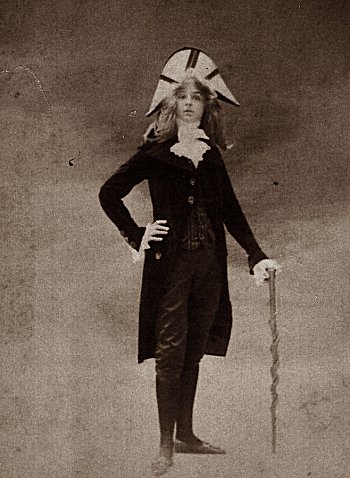
Renée Vivien
(1877–1909)
Prolong the night
Prolong the night, Goddess who sets us aflame!
Hold back from us the golden-sandalled dawn!
Already on the sea the first faint gleam
Of day is coming on.
Sleeping under your veils, protect us yet,
Having forgotten the cruelty day may give!
The wine of darkness, wine of the stars let
Overwhelm us with love!
Since no one knows what dawn will come,
Bearing the dismal future with its sorrows
In its hands, we tremble at full day, our dream
Fears all tomorrows.
Oh! keeping our hands on our still-closed eyes,
Let us vainly recall the joys that take flight!
Goddess who delights in the ruin of the rose,
Prolong the night!
Renée Vivien poetry
fleursdumal.nl magazine
More in: Archive U-V, Renée Vivien, Vivien, Renée
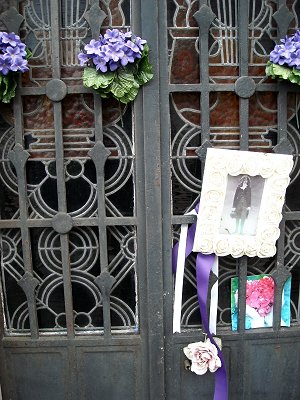
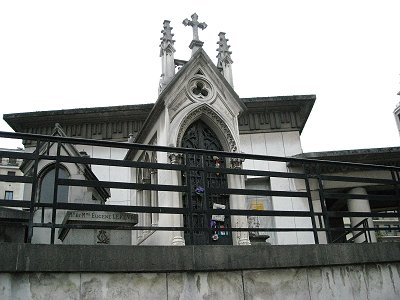
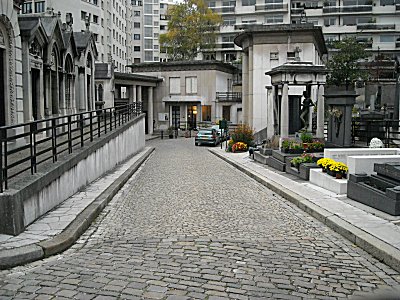
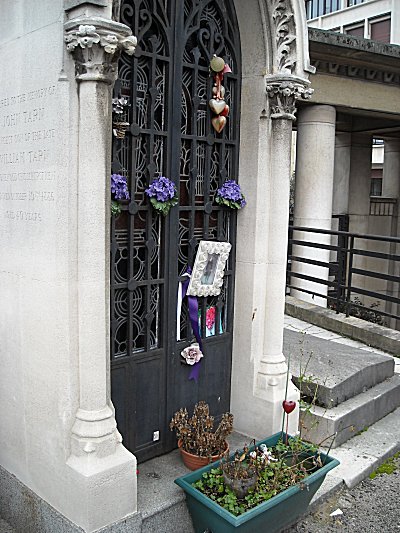
Renée Vivien (1877–1909)
born Pauline Mary Tarn (11 June 1877 – 18 November 1909) was a writer and poet.
She was born in London and has been buried in Paris in Cimetière de Passy.
photos: jef van kempen 2011
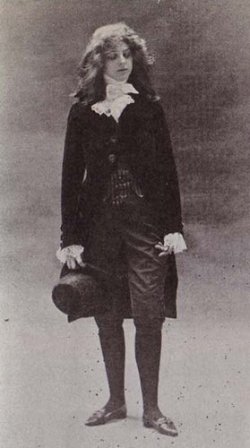
fleursdumal.nl magazine
More in: FDM in Paris, Galerie des Morts, Renée Vivien, Vivien, Renée

Henry Bataille
(1872-1922)
Le mois mouillé
Par les vitres grises de la lavanderie,
J’ai vu tomber la, nuit d’automne que voilà…
Quelqu’un marche le long des fossés pleins de pluie…
Voyageur, voyageur de jadis, qui t’en vas,
A l’heure où les bergers descendent des montagnes,
Hâte-toi. – Les foyers sont éteints où tu vas,
Closes les portes au pays que tu regagnes…
La grande route est vide et le bruit des luzernes
Vient de si loin qu’il ferait peur… Dépêche-toi :
Les vieilles carrioles ont soufflé leurs lanternes…
C’est l’automne : elle s’est assise et dort de froid
Sur la chaise de paille au fond de la cuisine…
L’automne chante dans les sarments morts des vignes…
C’est le moment où les cadavres introuvés,
Les blancs noyés, flottant, songeurs, entre deux ondes,
Saisis eux-mêmes aux premiers froids soulevés,
Descendent s’abriter dans les vases profondes.
Henry Bataille poetry
fleursdumal.nl magazine
More in: Archive A-B, Bataille, Henry

ANNE BOLEYN (1507-1536)
It was for Anne that Henry VIII gave up the wife with whom he had lived for twenty years; it was for Anne that he broke his hitherto unbroken allegiance of England to the Pope of Rome; tl was for Anne that he braved the anger of the great powers of Europe.Yet it was this same Anne who, but two years after her marriage, was writing to her passionate lover the following heart-broken letter—while awaiting her death.
TO THE KING
SIR, Your Grace’s displeasure and my imprisonment are things so strange unto me, as what to write, or what to excuse, I am altogether ignorant. Whereas you send unto me (willing [me] to confess a truth, and to obtain your favour) by such an one whom you know to be mine ancient professed enemy. I no sooner conceived this message by him, than I rightly conceived your meaning; and, as you say, confessing a truth indeed may procure my safety, I shall with all willingness and duty perform your command.
But let not your Grace ever imagine that your poor wife will ever be brought to acknowledge a fault where not so much as a thought thereof proceeded. And to speak a truth, never prince had wife more loyal in all duty, and in all true affection, than you have ever found in Anne Boleyn; with which name and place I could willingly have contented myself, if God and your Grace’s pleasure had been so pleased. Neither did I at any time so far forget myself in my exaltation or received queenship, but that I always looked for such an alteration as now I find: for the ground of my preferment being on no surer foundation than your Grace’s fancy, the least alteration I knew was fit and sufficient to draw that fancy to some other subject. You have chosen me from a low estate to be your queen and companion, far beyond my desert or desire. If then you found me worthy of such honour, good your Grace, let not any light fancy or bad counsel of mine enemies withdraw your princely favour from me; neither let that stain, that unworthy stain, of a disloyal heart towards your good Grace, ever cast so foul a blot on your most dutiful wife, and the infant princess, your daughter.
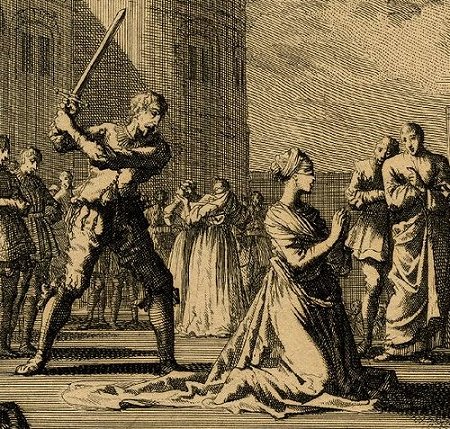
Try me, good king, but let me have a lawful trial; and let not my sworn enemies sit as my accusers and my judges; yea, let me receive an open trial, for my truth shall fear no open shame. Then shall you see either mine innocency cleared, your suspicions and conscience satisfied, the ignominy and slander of the world stopped, or my guilt openly declared; so that, whatsoever God or you may determine of me, your Grace may be freed from an open censure; and mine offence being so lawfully proved, your Grace is at liberty, both before God and man, not only to execute worthy punishment on me, as an unlawful wife, but to follow your affection already settled on that party for whose sake I am now as I am, whose name I could some good while since have pointed unto; your Grace not being ignorant of my suspicion therein.
But if you have already determined of me; and that not only my death, but an infamous slander, must bring you the enjoying of your desired happiness; then I desire of God that he will pardon your great sin therein, and likewise my enemies the instruments thereof; and that He will not call you to a strict account for your unprincely and cruel usage of me, at his general judgementseat, where both you and myself must shortly appear; and in whose judgement, I doubt not, whatsoever the world may think of me, mine innocence shall be openly known and sufficiently cleared.

My last and only request shall be, that myself may only bear the burden of your Grace’s displeasure, and that it may not touch the innocent souls of those poor gentlemen who, as I understand, are likewise in strait imprison¬ment for my sake. If ever I have found favour in your sight, if ever the name of Anne Boleyn hath been pleasing in your ears, then let me obtain this request; and I will so leave to trouble your Grace any further; with mine earnest prayers to the Trinity, to have your Grace in his good keeping, and to direct you in all your actions. From my doleful prison in the Tower, this 6th of May. Your most loyal and ever faithful wife.
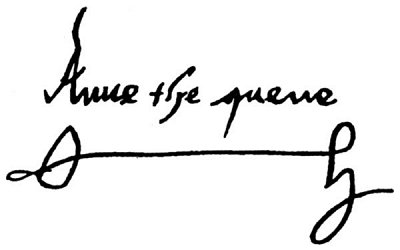
ANNE BOLEYN (1536)
fleursdumal.nl magazine
More in: Anne Boleyn, Archive A-B


Hans Hermans: Paris La Tour Eiffel
fleursdumal.nl magazine
More in: FDM in Paris, Hans Hermans Photos

Een diva en haar nachtegalen
De stilte maakt haar gedachten onrustig
zij die denkt het leven te beheersen
met koffie, vrienden en bio-groenten
zij weet dat het anders kan
met vaste eettijdstippen, slaaprituelen
uitstappen en familiebezoeken
meer als vroeger
retro, dit woord bekt nu beter
is ze ouderwets, niet van deze planeet
verzuurd, gefrustreerd of alternatief bevlogen
ze opent koffer waar de muziekplaten in zitten
haar vingers weten precies waar te stoppen
uit een afgeleefde kaft, haar lievelingsnummer
in het spiegelglas van de keukendeur zingt ze
als diva, zo doordringend hapervrij dat
zelfs de nachtegalen op de linnen lampenkap
zich blozend verrast omdraaien
Erica De Stercke
fleursdumal.nl magazine
More in: Archive S-T, De Stercke, Erika
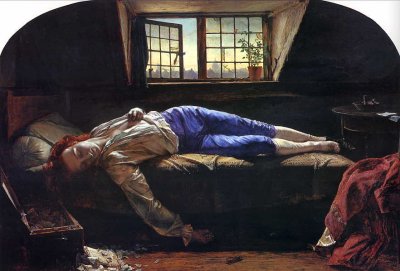
Thomas Chatterton
(1752-1770)
A New Song
Ah blame me not, Catcott, if from the right way
My notions and actions run far.
How can my ideas do other but stray,
Deprived of their ruling North-Star?
A blame me not, Broderip, if mounted aloft,
I chatter and spoil the dull air;
How can I imagine thy foppery soft,
When discord’s the voice of my fair?
If Turner remitted my bluster and rhymes,
If Hardind was girlish and cold,
If never an ogle was got from Miss Grimes,
If Flavia was blasted and old;
I chose without liking, and left without pain,
Nor welcomed the frown with a sigh;
I scorned, like a monkey, to dangle my chain,
And paint them new charms with a lie.
Once Cotton was handsome; I flam’d and I burn’d,
I died to obtain the bright queen;
But when I beheld my epistle return’d,
By Jesu it alter’d the scene.
She’s damnable ugly, my Vanity cried,
You lie, says my Conscience, you lie;
Resolving to follow the dictates of Pride,
I’d view her a hag to my eye.
But should she regain her bright lustre again,
And shine in her natural charms,
‘Tis but to accept of the works of my pen,
And permit me to use my own arms.
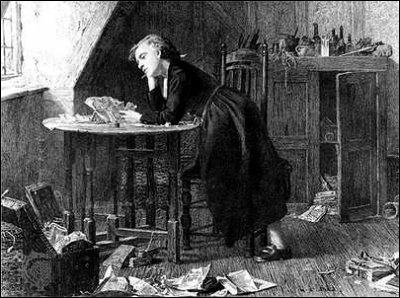
fleursdumal.nl magazine
More in: Archive C-D, Chatterton, Thomas, Thomas Chatterton
Leven en dood van een jonggestorven Engel
Vele jaren na haar zelfgekozen dood rijst de ster van Francesca Woodman (1958-1981). Na Parijs is het fascinerende oeuvre van deze jonggestorven fotografe nu te zien in de Rotterdamse Kunsthal.
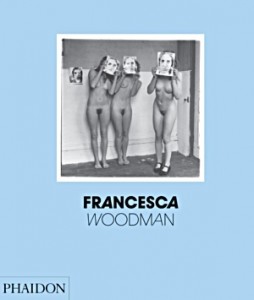 Francesca Woodman was nog geen 23 toen ze een eind aan haar leven maakte. De manier waarop – ze sprong uit een raam – doet onmiddellijk denken aan de serie foto’s waarin zij zich afbeeldde als engel. En je ontkomt er niet aan om haar hele oeuvre te zien in het licht van deze vroege dood. Het grote talent van Woodman, dochter van een in Italië levend Amerikaans kunstenaarsechtpaar, openbaarde zich al vroeg. De overzichtstentoonstelling opent met twee zelfportretten. Het eerste – een naakt met lelies – doet aan een 19e eeuwse atelierstudie denken. Het tweede – Zelfportret op 13-jarige leeftijd – is eerder experimenteel van aard en heeft iets akelig verontrustends als in een thriller. Zoals zo vaak blijft het gezicht onzichtbaar.
Francesca Woodman was nog geen 23 toen ze een eind aan haar leven maakte. De manier waarop – ze sprong uit een raam – doet onmiddellijk denken aan de serie foto’s waarin zij zich afbeeldde als engel. En je ontkomt er niet aan om haar hele oeuvre te zien in het licht van deze vroege dood. Het grote talent van Woodman, dochter van een in Italië levend Amerikaans kunstenaarsechtpaar, openbaarde zich al vroeg. De overzichtstentoonstelling opent met twee zelfportretten. Het eerste – een naakt met lelies – doet aan een 19e eeuwse atelierstudie denken. Het tweede – Zelfportret op 13-jarige leeftijd – is eerder experimenteel van aard en heeft iets akelig verontrustends als in een thriller. Zoals zo vaak blijft het gezicht onzichtbaar.
Zoektocht
De eigen persoon is steeds het belangrijkste vertrekpunt geweest van Woodmans met raadsels omgeven fotografische zoektocht. Dat heeft absoluut niet geleid tot navelstaarderij. En evenmin blijft haar blik op het eigen lichaam beperkt tot de esthetiek. Bijna alle foto’s ademen dezelfde sfeer van vergankelijkheid. En soms zeer letterlijk. Bijvoorbeeld waar de fotografe zich – met opzet bewegend en daardoor als het ware vervluchtigend – afbeeldt als een soort geest die door een grafsteen wegkruipt. Of daar waar haar lichaam op lijkt te gaan in een verweerde muur van een afbraakhuis. Het zijn beelden die buiten onze tijd lijken te staan.
Eigen wereld
Ook als zij andere modellen gebruikt, is Woodman bezig met het scheppen van een eigen wereld. Zo is er een serie waarin zij een oude naakte man een absurd toneelstuk laat opvoeren met spiegels en glas. Uit diezelfde periode (1976/1977) dateert ook een van de foto’s van zichzelf als engel. Geen lieflijke engel, de open mond lijkt eerder naar adem te happen of te schreeuwen. Een van de laatste foto’s toont een badkuip waar nog net een stukje gezicht van een vrouw bovenuitsteekt. Je denkt aan zelfmoord. En na al die andere beelden weet je dat dat echt niet alleen maar komt door de wetenschap dat Francesca Woodman zich op 19 januari 1981, kort na de publicatie van haar eerste boek, van het leven beroofde. Het is op de eerste plaats aan haar ouders te danken dat dit bijzondere, ongrijpbare oeuvre nu door Europa mag reizen.
Joep Eijkens
(Joep Eijkens: Retrospectief van fotografe Francesca Woodman, Kunsthal Rotterdam, Leven en dood van een jong gestorven ’engel’, in Brabants Dagblad 17 september 1998)
fleursdumal.nl magazine
More in: Francesca Woodman, Francesca Woodman, Joep Eijkens Photos

Ton van Reen
DE GEVANGENE V
Leo zou de straat uit willen lopen, al was het alleen maar om te zien naar wie meneer Pesche stond te zwaaien. Leo kon niet lopen. Aan zijn armen had hij ook niets. Het zou het beste voor hem zijn als hij alleen romp was. Kon hij zich de Hoofdstraat in rollen. Werd hij vanzelf onder de voet gelopen. Het verkeer was toch een horde.
Ergens in de straat was iemand aan het werken. Binnenshuis. Regelmatig klonken er slagen van hamer op beitel. Iemand was bezig in zijn huis een muur te slopen. Leo verdacht de man zonder rechterarm ervan. Niemand zou zo regelmatig kunnen werken met hamer en beitel als een man met enkel een linkerarm.
Zo zat Leo achter de ruit te wachten op de avond, en het was pas ochtend. Hij zou nu al willen zien hoe het donker de straat inkwam. Werd het erin gereden op wieltjes? Gleed het? Werd het donker rondgestrooid vanuit de lucht die hij in geen twintig jaar had gezien? De huizen hielden hem voor hem verborgen. Hij kon alleen de straat en de gevels zien.
Als het avond wordt, zou ik best mijn uniform aan willen trekken, dacht Leo. Om de verjaardag van twintig jaar achter de ruit te vieren. Hij zou er netjes op staan in het uniform. Toch zou niemand het mogen zien. Hij had een mooi uniform. Van paardendekenstof. Op die stof hadden prachtige speldjes gezeten. Weliswaar minder dan op de stof van korporaal Waskop, maar genoeg voor Leo om er tevreden mee te zijn. Die speldjes waren belangrijk geweest. Ze heetten: de eer van het regiment. De eer van het regiment werd uitgerekend in speldjes en lintjes en bij elk appèl werden ze geteld door de kapiteins van de compagnieën. De eer moest gedragen worden op de paardendekenstof die, als je er een broek van maakte, zo langs je benen schuurde dat er geen haartje op bleef staan. De speldjes werden geteld en gewogen. Daarom mocht niemand sneuvelen. Dat zou betekenen dat er minder speldjes waren. Dat was slecht voor de eer van het regiment enzovoort.
Het uniform van paardendekenstof had hij na de oorlog mogen houden. Het hing al twintig jaar in de kast. Al die tijd had hij het niet gezien. Het had altijd helemaal alleen in de kast gehangen. Zoveel kleren had Leo niet om in de kast te hangen. De speldjes waren er afgehaald. Die had hij niet mogen houden. Heldenmoed was alleen eer voor het regiment, niet voor de held. Of hij moest officier zijn. Anderen, die wel konden lopen, droegen nu de speldjes. Meestal waren dat korporaals die Waskop heetten en kogelbanen konden becijferen of het kunst was en die nooit op de plaats stonden waar de voor hen bestemde granaat insloeg.
De benen van het uniform uit paardendekenstof waren verbrijzeld. Leo wist niet of de kleur van de stof na het verbrijzelen anders was geworden.
`Kijk in de kast, mijn kleine meisje’, fluisterde hij.
In het huis aan de overkant zou het meisje zich nu aan het aankleden zijn.
(wordt vervolgd)
fleursdumal.nl magazine
More in: - De gevangene
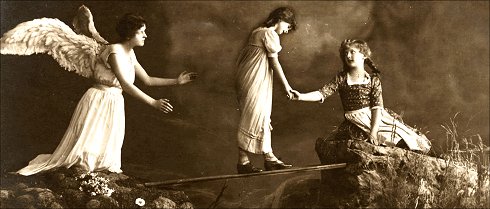
Märchen der Brüder Grimm
Jacob Grimm (1785-1863) & Wilhelm Grimm (1786-1859)
Das Totenhemdchen
Es hatte eine Mutter ein Büblein von sieben Jahren, das war so schön und lieblich, daß es niemand ansehen konnte, ohne mit ihm gut zu sein, und sie hatte es auch lieber als alles auf der Welt. Nun geschah es, daß es plötzlich krank ward, und der liebe Gott es zu sich nahm; darüber konnte sich die Mutter nicht trösten und weinte Tag und Nacht. Bald darauf aber, nachdem es begraben war, zeigte sich das Kind nachts an den Plätzen, wo es sonst im Leben gesessen und gespielt hatte; weinte die Mutter, so weinte es auch, und wenn der Morgen kam, war es verschwunden. Als aber die Mutter gar nicht aufhören wollte zu weinen, kam es in einer Nacht mit seinem weißen Totenhemdchen, in welchem es in den Sarg gelegt war, und mit dem Kränzchen auf dem Kopf, setzte sich zu ihren Füßen auf das Bett und sprach ‘ach Mutter, höre doch auf zu weinen, sonst kann ich in meinem Sarge nicht einschlafen, denn mein Totenhemdchen wird nicht trocken von deinen Tränen, die alle darauf fallen.’ Da erschrak die Mutter, als sie das hörte, und weinte nicht mehr. Und in der andern Nacht kam das Kindchen wieder, hielt in der Hand ein Lichtchen und sagte ‘siehst du, nun ist mein Hemdchen bald trocken, und ich habe Ruhe in meinem Grab.’ Da befahl die Mutter dem lieben Gott ihr Leid und ertrug es still und geduldig, und das Kind kam nicht wieder, sondern schlief in seinem unterirdischen Bettchen.
ENDE
Die Märchen der Brüder Grimm
fleursdumal.nl magazine
More in: Grimm, Grimm, Andersen e.o.: Fables, Fairy Tales & Stories, Grimm, Jacob & Wilhelm
Thank you for reading Fleurs du Mal - magazine for art & literature